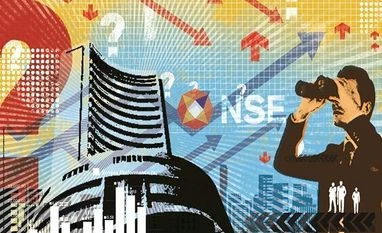The equity market witnessed high volatility on the last two days of the previous week. The Sensex dropped 2,702 points, or 4.7 per cent, on Thursday as Russia invaded Ukraine. On Friday, however, it rose 1,328 points, or 2.44 per cent. It may continue to remain volatile in the near future.
Geopolitics and inflation
In the near term, the Russia-Ukraine conflict could continue and keep the market on the boil.
Inflation and interest-rate hikes will also contribute to equity market volatility this year. “Besides the prevailing geopolitical tensions, a calibrated withdrawal of liquidity support and interest rate hikes by central banks will occur across the globe,” says Mrinal Singh, chief executive officer (CEO) and chief investment officer (CIO), InCred Asset Management. The central banks have a hard balancing act to perform. If they don’t raise interest rates sufficiently, they will fail to quell inflation. But if they raise rates too much, they could cause economic growth to stall.
Singh adds that even the pandemic could spring more surprises.
Corporate results will play a key part. “Any disappointment on the domestic earnings front could add to volatility,” says Narendra Solanki, head-equity research (fundamental), Anand Rathi Shares & Stock Brokers.
Don’t sell in panic
Whenever a big geopolitical event, like a war, occurs, the markets usually crash in the immediate aftermath (see table). “However, they usually recover in a few months,” says Solanki. Holding on to your equity portfolio and allowing the turbulence to pass is an effective response. “Do not sell in panic,” says Rahul Bhutoria, director, Valtrust Capital.
Hunt for quality
Retail investors, especially the ones who entered the market between April 2020 and now and have only been part of a rising market, need to face the altered reality. “They must accept that equity is an intrinsically volatile asset class,” says Ankur Kapur, managing partner, Plutus Capital, a Sebi-registered investment advisory firm. They need to reassess if they have the disposition to handle this volatility. Those who get unduly perturbed should reduce their equity exposure or take the mutual fund route.
Long-term investors must maintain faith in the economy’s prospects. “The Indian economy is on firm ground and is likely to stay robust over the long term,” says Singh. He suggests investors building long-term portfolios treat this volatility as an opportunity to invest in quality companies and themes at compelling valuations.
However, they need to be cautious. “At the onset of a crisis, it is challenging to assess its implications and length accurately. Hence, investors need to be discerning and invest only in opportunities that promise a degree of certainty,” adds Singh.
Kapur emphasises the need to stick to companies that offer a high return on investment (RoI).
Only the prepared investor can take advantage of the opportunities that corrections throw up. “Analyse companies in advance and prepare a list of the ones you would like to buy. Then when an opportunity arises, you can act decisively,” says Kapur.
Another prerequisite is to keep your powder dry. “Keep some cash in your portfolio. If risk appetite permits, dip into your cash reserves and invest in equity,” says Bhutoria.
Avoid leveraged bets
At a time when interest rates could rise, sectors that are highly leveraged or disproportionately impacted by interest rates could feel some pain in the short-term, according to Singh. Most investors should also avoid leveraged bets through the use of futures and options.
Smaller companies could be impacted more during a turbulent phase. However, Kapur says those who hold quality names in this space need not worry.
Add debt and gold
Investors who only have exposure to equities must diversify into debt for stability. In this rising-rate environment, they should stick to shorter-duration debt funds and target maturity funds.
Gold demonstrated its resilience on Thursday, when it rose amid the mayhem in equities. “This is not surprising since gold has always provided a hedge during a geopolitical crisis and is the best safe-haven asset,” says Pritam Patnaik, head-commodities and HNI, NRI Acquisition, Axis Securities.
Gold, too, may be turbulent over the next few months. “Whenever the US Fed hikes rates, gold could correct. But the current inflationary environment will support it,” says Patnaik.
According to him, five rate hikes of 25 basis points each by the US Fed are priced in. “If the Fed turns less hawkish because its rate hikes upend growth, that will be positive for gold,” he says. He advises investors to use every dip as an opportunity to invest until they have built a 10-15 per cent allocation.
Check your asset allocation
Mutual fund investors may check their asset allocation to ensure it is in sync with their risk appetite. If it is, they should keep their systematic investment plans (SIPs) going. Each SIP tranche purchases more units during a market correction, which provides a kicker to longer-term returns.
Investors who are unable to maintain an asset-allocated portfolio should take a qualified financial advisor’s help. Advisors handhold investors during periods of high turbulence and prevent them from acting rashly. Those who don’t have an advisor, and find it tough to negotiate such turbulent phases, should invest in hybrid categories like a balanced advantage fund or a multi-asset fund.
Unlock 30+ premium stories daily hand-picked by our editors, across devices on browser and app.
Pick your 5 favourite companies, get a daily email with all news updates on them.
Full access to our intuitive epaper - clip, save, share articles from any device; newspaper archives from 2006.
Preferential invites to Business Standard events.
Curated newsletters on markets, personal finance, policy & politics, start-ups, technology, and more.
)